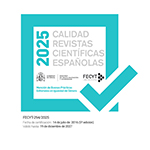The Reception of Stefan Zweig’s Work in Spain during the Second World War
Abstract
This article analyses the reception of Stefan Zweig’s work in Spain during Franco’s regime, a period of severe intellectual and cultural censorship. Such control was also influenced by the diplomatic relationship between the Spanish government, which was partly germanophile, and the German National Socialist state. In the midst of the Second World War, Stefan Zweig’s suicide in exile shocked the world and was widely reported by the international press. This paper will argue that this act, which was against the dominant ideology of the Spanish regime, may have influenced the publication of the work of the author in Spain. To that end, a study has been conducted both of Zweig’s work published between 1939 and 1947, as well as of the reaction of the Spanish press to his suicide.Downloads
Article download
License
In order to support the global exchange of knowledge, the journal Revista de Filología Alemana is allowing unrestricted access to its content as from its publication in this electronic edition, and as such it is an open-access journal. The originals published in this journal are the property of the Complutense University of Madrid and any reproduction thereof in full or in part must cite the source. All content is distributed under a Creative Commons Attribution 4.0 use and distribution licence (CC BY 4.0). This circumstance must be expressly stated in these terms where necessary. You can view the summary and the complete legal text of the licence.










